TemporoMandibular Joint Disorder – TMJ consists of a number of problems involving the teeth, muscles, ligaments, and bones of the skull or joints that prevent your jaw’s movement from functioning correctly. The most common causes of TMJ are trauma to the face and jaw, clenching, grinding, missing teeth and stress (Anxiety and/or Depression).
TMJ symptoms
TMJ symptoms are multiple and varied ranging from pain in the head to a sensation of weakness of the arm and leg muscles.
Patients suffering from TMJ have experiencing symptoms like:
- Headaches, particularly present upon awakening
- Pain in the neck
- Tenderness of the jaw muscles
- Pain in or around the ear, temples, or cheeks that often spreads to the face
- Clicking, popping or grating sounds when opening or closing the mouth
- Pain or difficulty in chewing, yawning or opening wide
- Jaws that “get stuck” or “lock”
- Jaws that regularly feel stiff, tired, or tight
- Unexplained tooth aches
- Earache or pain when no infection is present
- Dizziness
TemporoMandibular Joint Disorder or TMJ symptoms can be very frustrating. TMJ is often difficult to diagnose, since the symptoms are broad and could mimic neurological or orthopedic symptoms. Patients tend to seek medical attention elsewhere when, in fact, a dentist trained in TMD may offer the most immediate and appropriate solution.
If you want a consultation, call us to schedule your appointment. 305 666 0375
